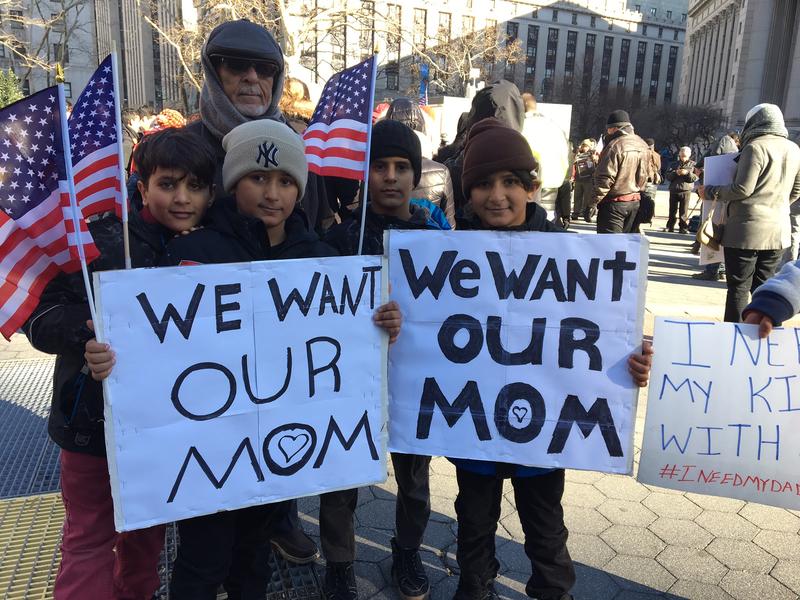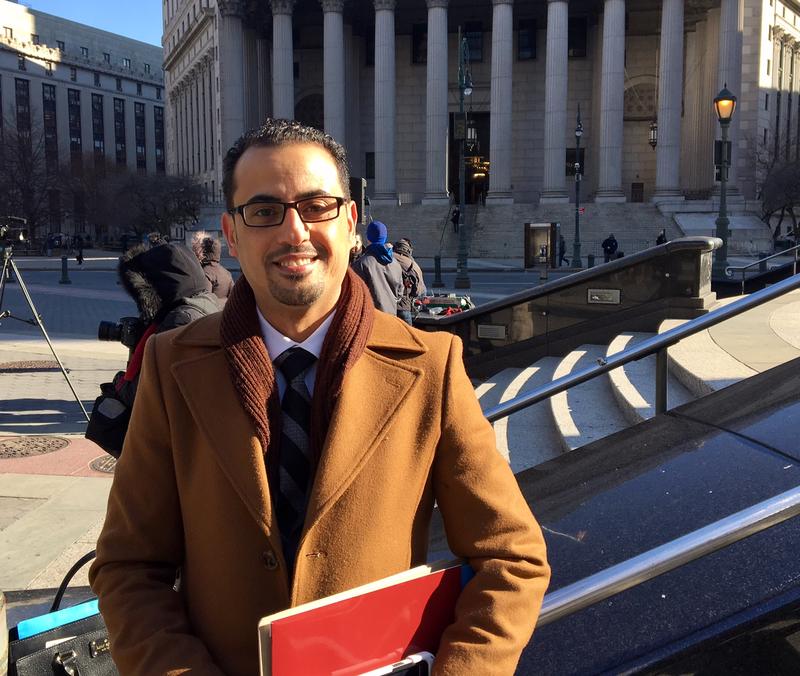
Twelve year-old twins Alawi and Abdullah Shaibi aren't sure why they haven't seen their mother in more than three years, but they think it has something to do with a closed airport.
"We just want her to come, we love her and miss her," said Alawi.
On Wednesday, the twins were among more than 100 Yemeni Americans who rallied in the freezing cold at Lower Manhattan's Foley Square to protest the Trump Administration's travel ban. They had come from Buffalo with other relatives, who explained that their father applied for their mom to come to the U.S. from Yemen. But she's been stuck in Djibouti with her four other children while she waits for her visa to be processed.
Many of those at the rally said they have spouses and children who are either trying to leave the war torn country, or who escaped Yemen and are stuck in limbo abroad because of the travel ban. Although tied up in courts for much of the year, President Trump's executive order on immigration now applies to eight countries the White House claims don't have adequate screening measures.
Wail Alkhaili, of Brooklyn, said he came to the U.S. three years ago and won asylum. But his wife and three sons have been waiting for two months in Djibouti for visas.
"I miss my wife and my kids, I need to get them to school to study," he said, adding that he supports them by driving for Uber.
Mohammed Alawadhi, 37, a doctor and professor who traveled from Little Rock, Arkansas to the rally said he's trying to reunite with his wife. The U.S. citizen said he met her when he traveled back to his native Yemen last year. They spent a month in a hotel, to be safe from the war, and he petitioned for her to join him. But after she "risked her life" to travel to the U.S. embassy in Djibouti (the embassy in Yemen has suspended visa services), she was stranded.
"They interviewed her, they reviewed her documents and everything...and approved her visa right away," he explained. But he said she was rejected because of U.S. immigration policies. He said he's worried about her because she has a heart condition.
"I knew I'm going to be facing some challenges but I never thought that a U.S. citizen will be denied," he said, of his effort to bring his wife to the country. "I've always lived to promote civil rights ... this is what this great nation stands for. Freedom, equality, justice and liberty. It's sad to see this happening."
Many immigrant advocates call the White House travel ban a "Muslim ban" because it applies to Muslim majority nations (except for Venezuela and North Korea). After the first travel ban in January was blocked, the second version allowed close relatives from affected countries to travel to America.
But the U.S. Supreme Court recently allowed a third and more restrictive version of the ban to go forward, while it's being challenged. As a result, family members from Yemen and the other affected countries face prolonged waiting times and have also been rejected.
In response to the Yemeni rally, Katie Waldman, a spokesperson for the Department of Homeland Security, said, "The security of the American people is this administration’s highest priority, and these improved vetting measures are essential for American security."
But Afaf Nasher, of the New York chapter of the Council of American-Islamic Relations, said the Trump Administration should reconsider the ban because of the war in Yemen.
American citizens "are faced with the decision of sending our kids literally back into the bullets and missiles overhead," she stated. "If that doesn't justify for any kind of humanitarian exception of some kind I don't know what does."

